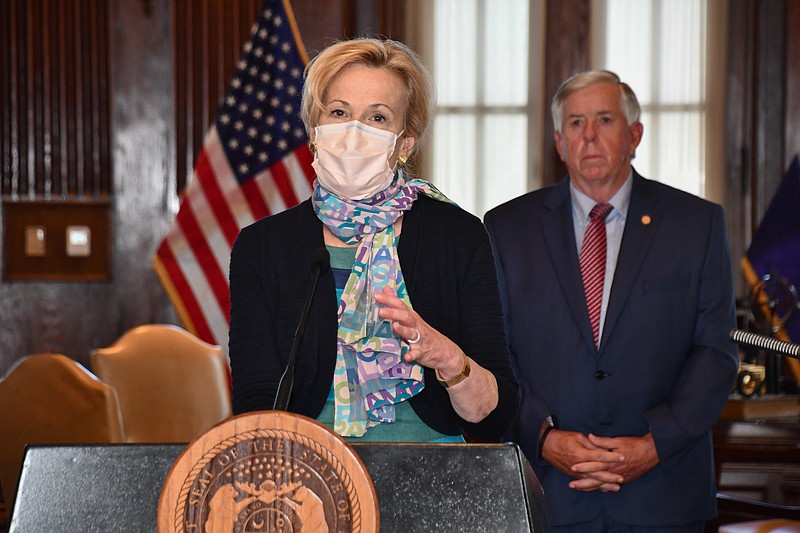The News Tribune is offering this article free to all readers because it includes information important to public safety and health in our community.
White House Coronavirus Response Coordinator Dr. Deborah Birx visited Missouri this week and met with local and state officials, and Birx addressed the people of the state Tuesday with a message to do more to protect themselves and others.
"We need every American and everybody in Missouri wearing a mask and socially distancing," Birx said.
Birx's career has been in combating HIV/AIDS, and since 2014 she has led the U.S. effort to combat that virus and disease around the world, according to the U.S. Department of State. Before that, she directed the Centers for Disease Control and Prevention's global health division for HIV/AIDS.
President Donald Trump and Vice President Mike Pence appointed Birx to coordinate the White House's task force on the coronavirus that causes COVID-19.
Birx told reporters Tuesday at the door of Gov. Mike Parson's office in the Missouri State Capitol that Trump and Pence had asked her to visit states and meet with mayors and governors to get a sense of where things stand and how mitigation efforts against COVID-19 could be improved.
"We wanted to really understand what each of the governors and mayors were doing - what the plans were, what additional mitigation was needed, and to really understand the precautions taken in schools, nursing homes, colleges and universities," Birx said.
She said her "fundamental message to everyone in Missouri is we have a habit of looking at an institution where there's a test positive case, and we don't look back and say, 'That case came from the community.'"
"Nursing homes do not spontaneously become COVID-19-infected. It comes in through staff or visitors," and "it reflects the community," Birx said.
She added, however, that not all vulnerable people live in places such as nursing homes. There are people with heart or kidney disease, diabetes or high blood pressure who live with their families in multi-generational households. "Let's help protect them, at the same time we protect those in the nursing homes, by ensuring every day that we're decreasing the community spread of this virus," Birx said.
No matter where Missourians live, she said, "our job in each and every community is to decrease viral spread and to clear a pathway forward, together, to control this virus" - a pathway that will allow for schools and colleges to be open and for sports to resume.
"Every person needs to really ensure that they're not infecting another, and that means we can't have these large parties because of the level of asymptomatic spread," Birx said.
Young people are generally more likely to escape serious illness and recover from COVID-19 - though not immune to the possibility of death or long-lasting health consequences. As more people become infected with COVID-19, however, the more likely the disease is to reach especially vulnerable populations.
"I know we all want to believe our family members or our neighbors couldn't possibly have COVID," Birx said. I can tell you, across the United States, that they do; and it doesn't matter if you're in a rural area or an urban area, they do - they don't know they're infected, and they are spreading the virus to others."
Social distancing means people should not be having large gatherings - including in their backyards, outdoors - until there is an effective vaccine to treat the novel coronavirus that causes COVID-19, she said.
"We've seen parties in Texas where 150 out of 150 people were infected - an outdoor party," she added.
On whether Missouri needs a statewide mask mandate, Birx told a reporter Tuesday that public health messages must be adjusted to suit local conditions - Missouri has some counties with low case numbers and low test positivity rates.
However, she added that Missourians should know how to protect themselves from the coronavirus.
She said a mask mandate specifically was discussed with Missouri Gov. Mike Parson as it related to an approach Texas, in particular, has taken - mandating masks in counties that have more than 20 active cases.
Birx also said if all retailers require masks, "it sends the message to the community that masks are important, and so we discussed that option about what Texas had done."
"It doesn't matter if you're a Democrat or a Republican; you need to wear a mask and social distance. You need to not have parties in your backyard, or in your living room," she later added.
Though Parson once again shied away from a mask mandate at the same news conference - after Birx spoke and took questions - he added that just because masks may not be mandated in an area does not mean people shouldn't wear them, especially if social distancing is not possible.
He credited Texas with taking a good approach and noted to a reporter that Missouri knows where its most active COVID-19 hot spots are, and those areas already have mask-wearing mandates.
"I think every day, this can be a moving target," Parson said. "I think we need to be able to make changes with the data."
This article was updated at 4:45 p.m. Aug. 18, 2020, with additional details.

